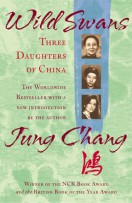This lengthy memoir by Jung Chang tells the story of 3 generations of women in China covering the period from the early 1900's to the late 1970's. It is long and, to my mind, would have benefitted from some judicious editing. That petty grip aside, it is a heartbreaking and compelling story of a nation struggling to emerge from feudality only to be plunged into wars, subjected to the mold of Communism, and then taken over by a despot who thought the only path to progress was through conflict. Jung Chang's grandmother was born just a few years too soon and so was still subjected to having her feet bound--a lifetime of physical torture in the service of a very bizarre notion of beauty. She was married off to a warlord and then, when he died, escaped and married a very kind older man who was a doctor. Her mother grew up with much more freedom and embraced Communism as a teenager and fell in love with a guerrilla fighter who rose to a position of considerable authority in the Party, as did she. Her mother, and Jung Chang herself, were to be repeatedly victimized by this man's rigid adherence to principle, and even though the government betrayed him brutally, he never gave up his ideals. The amount of self-sacrifice, both voluntary and enforced, are beyond what most of us can ever conceive of. The cult of Mao who made himself a god in the sense of absolute control over peoples lives and their very minds is starkly revealed through Chang's tales about the persecution of her parents and acquaintances. Mao was a master of manipulation and loosed a massive "Lord of the Flies" reign of terror that affected hundreds of millions of people. Mao's ideas about expertise in a subject or practice as a bad thing, worthy of imprisonment, is so foreign as to strain understanding. The ground constantly shifts and no one knows where they stand. It is a culture that praises ignorance and illiteracy and persecution based on petty grievances. And yet there are also accounts of outstanding loyalty and love. It is an eye-opening look into one of the largest nations in the world, that should give us all pause. Other reviews are here: Kirkus,
Keeping track of what I read by jotting down my reactions, providing information about the author, and linking to additional reviews. And occasional notes on other book related things...
Saturday, May 30, 2015
The Grail: A Year Ambling & Shambling through an Oregon Vineyard in Pursuit of the Best Pinot Noir Wine in the Whole Wild World
This year-long exploration of a working vineyard/ winery in the Dundee Hills of Oregon by Brian Doyle did not immediately strike me as a "must read," but friend Joan Ward convinced me to give it a try. After reading the first chapter--one two-page long sentence--I was hooked. Doyle is exuberant in his passion for learning more about how Oregon's famed pinot noir grapes are made into wines rivaling those of the French. He follows Jesse and Don Lange of Lange Winery around for a year learning about the trials and tribulations, the passion, the hard work, the exhilaration and satisfaction that accompany their pursuit of making the best pinot noir wine in the world. He waxes lyrical not only about wine making, but about bits of relevant history, relationships, and philosophy in general in this chronologically organized series of short chapters. Even if you are not a wine and food person, Doyle's writing and humor and made-up words will keep you fully and pleasurably engaged. And you just might find yourself wanting to go out and try some pinot noir.
When Demons Walk
A different series by Patricia Briggs, set in an alternate world, where magic exists--both good and bad magic. This is a "loosely woven" series called Sianim, in which mostly stand-alone stories share a common world with some overlap of characters. In this book the protagonist is a thief and apprentice magician, Sham, living in the worst slum of the former kingdom of Southwood, aptly named Purgatory. When her mentor, the wizard Maur, is murdered by a demon, she is pulled into an urgent hunt to find what the new rulers, the Cybellians, do not want to admit can exist but which is nevertheless killing people within the castle. Sham will pose as the mistress of the new Reeve of Southwood, Lord Kerim, in order to track down the murderous demon. Kerim was a warrior before he became the voice of the Cybellian god, Altis, and the role sits uncomfortably upon him, but he is striving to reconcile the conquered and the conquerors. Even though he does not believe in magie, Kerim seems to have a knack for rescuing magical creatures, like the blind stableboy who is a selkie. Still he comes to rely on Sham's magic as she begins to uncover the complex web of spells and runes that have Kerim as their primary target. The identity of the demon, who can disguise itself as anyone, shakes everyone to their core, and its power will challenge Sham to the limits of her skills and beyond. A really colorful cast of characters, good pacing for the story, and the well-thought out creation of an alternate reality are all trademarks of Briggs' writing that I have come to enjoy in her "Mercy Thompson" series; these qualities show up here as well. Search for Briggs in my blog to find posts on that series books.
Subscribe to:
Posts (Atom)


